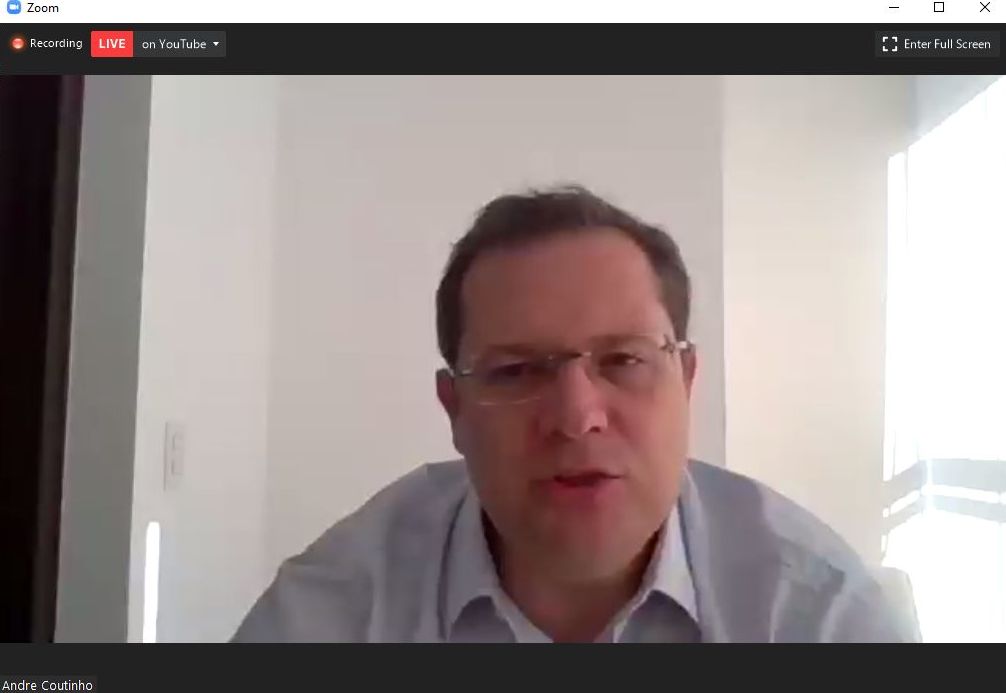São Paulo – Having a recovery plan can determine the performance and success of the companies after the novel coronavirus pandemic, which has ushered in major changes in markets across the world. This was one advice given in the online seminar “International Business and Legal Safety: Adaptations to the New Scenario,” hosted by the Arab Brazilian Chamber of Commerce on Wednesday (20), featuring specialists from Brazil and the United Arab Emirates.
The topic was addressed in the webinar by KPMG market leader André Coutinho (pictured above). “Just as it important was having a good crisis management plan and having a plan for business recovery (after the crisis), it’s important now to have a good plan for business recovery,” Coutinho told the audience of the online event, which was attended by 600 people from Brazil and elsewhere.

According to Coutinho, the plan must take into account cash flow, supply chain, competitiveness, among other things. “You are competing in a market and will have a fragilized customer base both in terms of impulse buying and financial situation,” KPMG market leader said. According to him, planning is hard given the current uncertainty. “But not having a recovery plan is not an option,” Coutinho said.
The KPMG’s executive said that the current challenge that is expected to last for two more months is big for any sector. A study by KPMG showed that few were the companies that have grown during the pandemic. “Most of them have suffered financially in terms of cash flow – which is big in a situation like this – and the health of their employees and the maintenance of business volumes in times of crisis,” he said.
He pointed out the different phases ushered in by the crisis. The first was the quick adjustment that the companies had to do, such as establishing remote working, and the need to make decisions that wouldn’t be harmful later on. The second was the adaptation to the crisis and resilience, which, he believes, will teach much to the companies in terms of knowledge and productivity. “Much has been said about technology, which will never be same,” he said.
The third phase is the recovery, which is yet to come in Brazil. “From what I hear from my colleagues at KPMG China, the bottom line is drawing up a good plan for business recovery,” André Coutinho said. He suggests a study of several possible scenarios – if it will occur next June or just in late 2020. “It’s extremely important that your business is able to return as quickly as possible,” Coutinho said.
The last phase will be living the new normal of the post-pandemic reality. “They are new realities that should be of concern for every executive, every company,” Coutinho said.
Both sectors that have managed to grow during the crisis and sectors that have been harmed by it will have to live in the new scenario. The first include delivery services, web conferencing software, telemedicine, snack manufacturers, and others. “The doubt that remains for these sectors that have stepped up so quickly is if this business volume will continue after the crisis, and I believe that for some it will,” he said. Studying if the consumption change is here to stay must be part of the recovery plan.

Some companies have suffered the effects of the social distancing and will resume business in the new context, but with reduced volumes. It’s the case of financial services, especially vehicle and apartment purchase financing. “Few people are considering changing their car this year,” Coutinho said. Another example are ride-hailing services, which will see a small demand considering the new possibility of people working from home.
Other sectors will see a slower recovery and will have to revive. “As it is a longer path, it requires a capital reserve, a good financial position of the company,” Coutinho said. The executive mentions the automotive industry – which had already been questioning the role of the car as a consumption desire for the younger generations – the real estate industry – because of the financial uncertainty – and tourism. He believes that tourism will be the last to recover.
For other industries, the crisis can remain for quite some time or even be permanent, such as airports and corporate travel companies. According to Coutinho, interpersonal relationship will change. “This that we are doing here will become much more common,” he said about the online seminar. The operational models will have to adapt to the virtual world, according to him. “The companies that were already adapted before the crisis have endured it much more quickly,” he said.
Coutinho said that one lesson the pandemic has left the companies is the need to be prepared for crisis, which usually occur about every four or five years. “We must always plan for and look at the crisis that will come,” he said.
Arab Chamber president Rubens Hannun, who moderated the discussions, agreed with Coutinho about the frequency of the crisis and the companies’ need to be prepared to face them. He pointed out the uncertainty of the current scenario. “We’re at a point where we don’t have any ready-made answers. The few answers we have come from those that have already gone through the pandemic, such as China, but its reality is different. Europe also lives a completely different context than ours,” he said.
Hannun said that the Arab Chamber hosted the webinar aiming at helping companies in management issues during this period and that the next web conferences to be hosted by the entity will also have this purpose. In addition to Hannun and Coutinho, the webinar featured Arab Chamber secretary-general Tamer Mansour, Baker & McKenzie Habib Al Mulla partners Tarek Saad and Pietro de Libero, Veirano Advogados partner Fábio Amaral Figueira, Marriott Hotels – Brasil sales and marketing director Nina Mazziotti, Arab Chamber legal director William Adib Dib Jr, and Travel Plus CEO Renato Aureliano.
Follow for more stories on the webinar and watch the full conference on YouTube.
Contracts must now include a pandemic clause
Marriott Brasil adapted to the new phase
Translated by Guilherme Miranda




